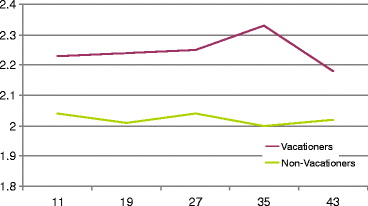 Now after the holidays are you rested, recharged and reinvigorated? Or has your holiday high evaporated into a hangover the size of a cartoon anvil as you drag your thoroughly vacationed self back to the grind? A study in the journal Applied Research in the Quality of Life asks a similar question: does vacationing make us happy?
Now after the holidays are you rested, recharged and reinvigorated? Or has your holiday high evaporated into a hangover the size of a cartoon anvil as you drag your thoroughly vacationed self back to the grind? A study in the journal Applied Research in the Quality of Life asks a similar question: does vacationing make us happy?
To answer this question, researchers from a handful of universities in the Netherlands used questionnaires to track the happiness of 1,530 Dutch people (including 974 vacationers) before, during and after their winter holidays. Here’s what they found: “Generally, there is no difference between vacationers’ and non-vacationers’ post-trip happiness.”
But that’s like saying there is no happiness difference between people who choose to eat slightly expired Thanksgiving leftovers and those who pitch them in the trash: many eaters are made slightly happier by the leftovers and a few eaters are made much less happy by the leftovers – and on balance the “eater” group has the same average happiness as the “pitch in the trash” group. The difference is the quality of the leftovers.
The same is true of vacations: a vacation can make you more or less happy, depending on its quality. And the study shows the difference between a spoiled and a still-good vacation. But first let’s take a look at the curve:

Before a vacation, people who will be vacationing are generally happier than those who are not vacationing. That makes sense: the vacationers have something to look forward to. Then after a vacation, the happiness of the vacationers plummets to levels significantly below the level of their happiness in the lead-up. So in general, anticipating a vacation makes you happy, but actually taking one does not.
That is, unless your vacation helps you chillax. The only group of vacationers that were happier after their vacation were ones who reported “relaxed” or “very relaxed” trips. Even neutral (and especially “stressful”) vacations were followed by falls off the happiness cliff. For chill vacationers, it took 8 weeks from the end of the vacation for happiness to return to the level of non-vacationers.
Interestingly, the study found no effect for the length of the trip – the pattern of happiness gain before the trip and then plummet after a stressful trip and gentle fadeout after a relaxing trip was the same for a 2-day getaway as it was for a 12-day holiday.
What this means, the researchers say, is that you’d be happier if you took a handful of short, relaxing vacations spread throughout the year, than if you took one, long trip to, say, a theme park, where the researchers write that, “When waiting in line for attractions at a theme park, in the heat, accompanied by impatient young children, such mildly stressful experiences could easily evolve into much more stressful events.”
The moral of the story: booking a short, relaxing vacation now can create the anticipation that will help you kick your holiday hangover.

